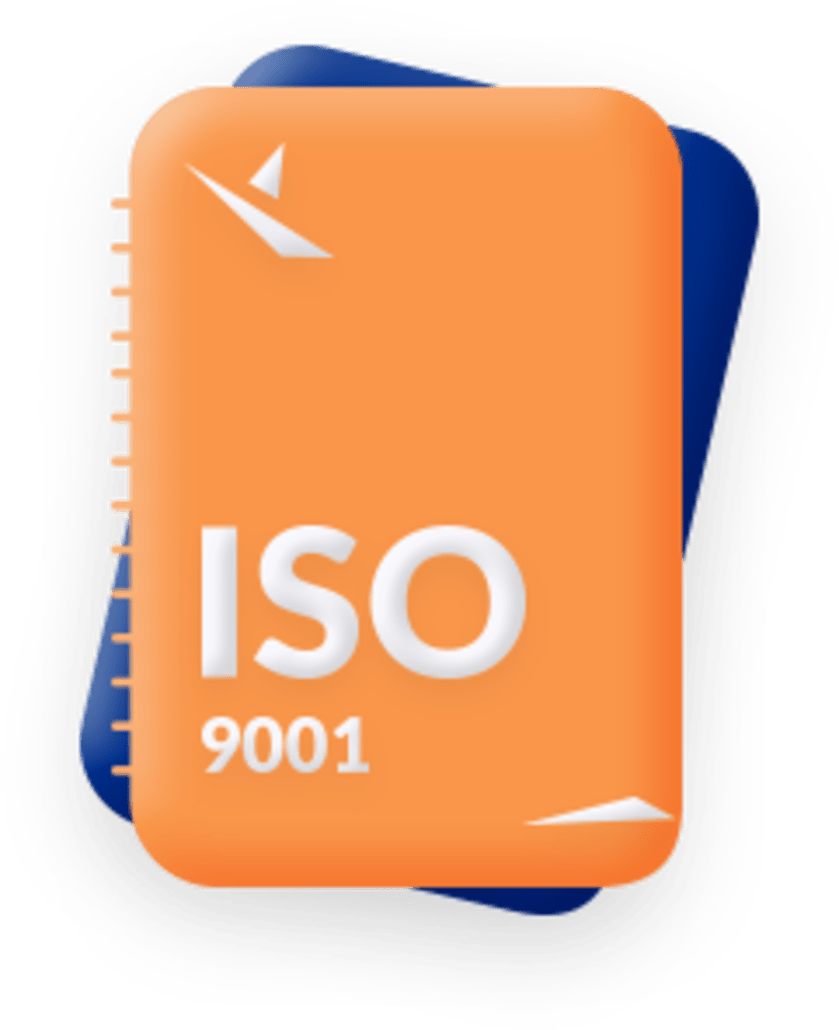What is ISO 9001 Certification?
ISO 9001:2015, known as the International Organization for Standardization’s (ISO) 9001 standard, is a globally recognized framework for implementing a Quality Management System (QMS). This standard provides organizations with a comprehensive guide to establish, implement, and continually enhance their QMS. It outlines the requirements necessary to ensure that an organization’s quality management processes align with international best practices. ISO 9001 serves as a structured approach for organizations striving to elevate their operations, enhance quality, and consistently meet or exceed customer expectations.
ISO 9001 certification results in heightened customer satisfaction. By conforming to ISO 9001 certification requirements, organizations ensure their processes are customer-centric and consistently deliver products and services that meet or surpass customer expectations. This leads to increased customer loyalty and positive word-of-mouth. Additionally, ISO 9001 certification promotes streamlined processes, increased operational efficiency, and reduced waste, resulting in cost savings and improved profitability. Furthermore, it enhances an organization’s risk management by proactively identifying and mitigating potential risks within its processes. Finally, ISO 9001 certification provides international credibility, which can open doors to new markets and collaborations, expanding the organization’s global reach and opportunities.
Choose Qcert Global for IAF-Recognized ISO 9001:2015 Certification
Based in Ahmedabad, India, Qcert Global is one of the leading Certification Provider for ISO and regulatory standards. Our portfolio of standards includes ISO 9001, ISO 14001, ISO 45001, ISO 50001, ISO 27001, ISO 22000, etc. What sets us apart is our commitment to deliver certifications that hold international recognition. We provide IAF-approved certification’s, which holds immense significance. An IAF-approved certification signifies that our certification process is aligns with globally recognized and accepted standards, ensuring that your certification holds value not only in your industry but also across borders.
Benefits of getting an ISO 9001 Certification
Quality Management System Certification isn’t just a recognition of operational excellence; it’s a strategic choice that propels your business towards greater success. Following are the benefits of obtaining an ISO 9001:2015 certification;
- Enhanced Credibility: Attaining ISO 9001 certification signals to clients and partners that your business is committed to exceptional quality standards and operational excellence.
- Market Advantage: A certified status sets you apart in competitive markets, often giving you the edge when bidding for contracts or gaining new customers.
- Customer Trust: ISO 9001 demonstrates your dedication to customer satisfaction, instilling trust and confidence in your brand.
- Global Recognition: An ISO 9001 certification is recognized internationally, broadening your market reach and facilitating expansion into new regions.
- Improved Brand Image: Certification underlines your commitment to delivering consistent, high-quality products or services, elevating your brand’s reputation.
- Efficiency Gains: The certification process often leads to streamlined processes and reduced waste, contributing to cost savings and enhanced profitability.
- Risk Mitigation: ISO 9001’s focus on risk management helps identify potential issues early, minimizing the chances of costly setbacks.
- Business Growth: As operations become more efficient, you’re better positioned to handle increased demand, fuelling business growth and scalability.
- Stakeholder Confidence: Shareholders and investors view ISO 9001 certification as a positive indicator of your business’s ability to manage risks and ensure sustainability.
- Continuous Improvement: ISO 9001 fosters a culture of continual improvement, allowing your business to stay adaptable and relevant in a dynamic market landscape.
Elevate Your Certification Path with Qcert Global’s ISO Training Expertise
Recognizing the pivotal role of training in the certification journey, Qcert Global goes beyond standard services by offering in-depth training solutions that bridge knowledge and practical implementation. Our training services are a crucial step toward certification, equipping individuals and teams with the tools and insights needed to proficiently implement and maintain quality management systems aligned with ISO standards.
Our Internal Auditor Training empowers participants to skilfully assess processes, identify improvement areas, and ensure ISO compliance. The culmination of our training programs isn’t just knowledge – it’s Qcert Global’s Training Certification, a badge of expertise that demonstrates your commitment to quality and process excellence. With Qcert Global’s training, you’re not only certified; you’re empowered for sustained certification success.
Get Sample Certificate
Have an insider’s view of one of the most popular and globally recognised certificates. Fill in your details and download in a single click.
Download NowFrequently Asked Questions
What is an ISO 9001 quality certification?
An ISO 9001 quality certification is an internationally recognized standard that verifies an organization’s commitment to maintaining and continually improving a robust Quality Management System (QMS). This certification focuses on enhancing processes, ensuring consistent product and service quality, and meeting or exceeding customer expectations.
What is the current ISO 9001 standard?
The current version of the ISO 9001 standard is ISO 9001:2015. It was published in September 2015 and is the most widely used quality management system (QMS) standard in the world. It is applicable to all organizations, regardless of their size, sector, or location.
What is the main purpose of ISO 9001?
The main purpose of ISO 9001 is to provide a systematic framework for organizations to establish and maintain an effective Quality Management System (QMS). This system aims to enhance the organization’s ability to consistently deliver products or services that meet or exceed customer expectations, while also fostering a culture of continuous improvement.
Who needs ISO 9001?
ISO 9001 is applicable to a wide range of organizations across various industries and sectors. It is not limited to a specific type or size of organization. Any entity, whether a small business, a non-profit organization, a government agency, or a large multinational corporation, can benefit from implementing ISO 9001. Here are some industries where ISO 9001 is particularly beneficial: Manufacturing Companies, Service Providers, Construction and Engineering Firms, Small Businesses, Government Agencies, Healthcare Organizations, Food and Beverage Industry, Aerospace and Défense, Automotive Industry, Information Technology, etc.
Is ISO 9001 compulsory?
No, ISO 9001 certification is not compulsory by law. It’s a voluntary standard that organizations can adopt to enhance their quality management systems and demonstrate commitment to quality. However, some contracts, industry regulations, and market demands might require or recommend ISO 9001 certification.
What is the ISO certificate for QMS?
The ISO certificate for Quality Management Systems (QMS) is typically referred to as the “ISO 9001 certificate.” It signifies that an organization has met the requirements outlined in the ISO 9001 standard, which focuses on implementing and maintaining effective quality management practices. This certification demonstrates the organization’s commitment to delivering consistent quality, meeting customer expectations, and continuously improving its processes.
What are the 7 QMS principles?
The seven Quality Management System (QMS) principles are the fundamental guidelines that underpin ISO 9001 and contribute to its effectiveness. These principles provide a framework for organizations to enhance their processes and achieve excellence in quality management. The seven QMS principles are:
- Engagement of people.
- Customer focus.
- Leadership.
- Process approach.
- Improvement.
- Evidence-based decision making.
- Relationship management.
What is the difference between QA and QMS?
Quality Assurance (QA) focuses on preventing defects and ensuring specific quality standards at certain points. Quality Management Systems (QMS) encompass all processes, from design to delivery, emphasizing overall quality, documentation, and continuous improvement. QA is a subset of QMS, addressing specific points, while QMS provides a comprehensive quality framework.
What are the 4 levels of documents in QMS?
Quality Management Systems (QMS) often have four distinct levels of documents that help establish and maintain quality standards and processes. These levels are:
- Quality Manual: Overarching policies and commitment.
- Procedures: Detailed process instructions.
- Work Instructions: Specific task guidelines.
- Records: Evidence of executed processes.



